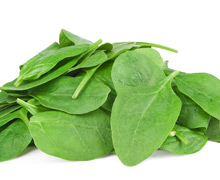
Spinach is a powerful superfood known for its health benefits for hair, skin and bones. Now you can add cancer protection to the list since researchers from Texas A&M University recently found eating spinach could protect you from colon cancer.
Colon cancer is the fourth-most common cancer in the U.S. and the second-leading cause of cancer-related deaths. Previous studies have shown a high-fiber diet with increased green vegetable consumption cuts the risk in half.
This study goes further in showing just how spinach affects gut health which can alter gene expression and change colon cancer outcomes. Scientists used animals to work with the hereditary disease called familial adenomatous polyposis which causes young people to develop multiple noncancerous polyps (small growths) in their colon. This condition is generally treated by surgically removing the colon to prevent hundreds of tumors growing in their colon as they age. They are then subjected to often-toxic medicines to prevent additional tumors from forming in the small intestine.
Researchers found spinach might aid in cancer prevention as well as delay or negate the need for radical surgery and prolonged drug treatment.
The animals with familial adenomatous polyposis were fed freeze-dried spinach for 26 weeks and researchers noticed significant antitumor activity in the colon and small intestine. Using an approach called multi-omics, which is a biological analysis involving data sets from multiple “omes” (genome, proteome, epigenome, etc.), researchers discovered the tumor suppression involved increased diversity in the gut microbiome (healthy bacteria) and changes in gene expression to help prevent cancer.
They also observed linoleate metabolites, which are fatty acids associated with the regulation of inflammation, rose to a beneficial level as a result of the spinach consumption.
Lead researcher Roderick Dashwood and his team saw how spinach showed anti-cancer benefits in other studies and wanted to see what happened in situations where genetic predisposition was high.
"My bias was to focus on the chlorophyll story because of my long history examining anti-cancer effects of chlorophyll," Dashwood said. "But it turned out the multi-omics approach prompted other ideas. When we looked at the metabolomic data, there was no chlorophyll. It was actually fatty acids and linoleic acid derivatives that were causing the beneficial effects."
While the majority of colon cancers are not driven by genetic predisposition, Dashwood said over time the exposure to carcinogens through diet and environment have the ability to change gene expression in the gut. This can lead to the development of polyps which can progress into cancer.
"We believe eating spinach can also be protective for people who do not have familial adenomatous polyposis," Dashwood said. "You shouldn't wait until polyps arise in order to start to do these sorts of preventive things."
